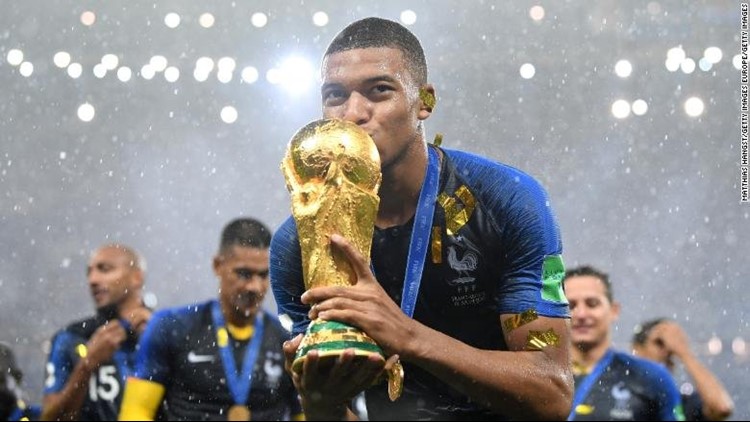After 64 matches, 169 goals, 49,651 passes and four red cards, Russia 2018 is over and France was the last team standing.
Widely regarded as one of the most entertaining World Cups ever held, thanks to sensational goals, dramatic last-gasp victories and controversies aplenty, it was a tournament which provided many unforgettable moments.
France’s Ligue 1 and the English Premier League season start in less than a month — August 10 — so, to ease the pain of those already dealing with football withdrawal symptoms, here are our top moments from a World Cup to remember.
VAR
It was perhaps inevitable that the pivotal moment of the final was decided by the Video Assistant Referee (VAR).
Throughout the tournament VAR had been talked about around the world, dominating discussion in stadiums, crowded pubs and cafes and millions of households — and it is still a talking point even though Les Bleus have long been crowned world champions.
Russia 2018 was the first World Cup to feature VAR and so when referee Nestor Pitana turned to VAR and subsequently awarded France a penalty for a Ivan Perisic handball, naturally it was the first time the system had come in to play in a World Cup final.
Had Perisic deliberately handled, conceding a penalty which gave France a 2-1 lead at the break? There are those who could still argue for and against.
“The decision disgusts me, absolutely disgusts me,” former Manchester United captain Roy Keane, working as a pundit for ITV, said of the penalty decision.
In the opening 48 group games, the system was 99.3% accurate, but it has been 100% successful in stirring up endless debates.
Mind your head
A slapstick moment to remember, if you’re not Belgium’s Michy Batshuayi that is.
Picking the ball out of the back of the net after Belgium had scored against England, the Chelsea striker attempted a celebratory punt into the crowd, but only managed to hit the post. His volley cannoned back to hit him square in the face.
Ouch.
The player later joked on Twitter: “Fortnite celebrations so overrated bro I had to create something new.”
A throw-in glitch
Iran’s Milad Mohammadi looked set to produce the most spectacular throw-in in World Cup history.
With ball in hand, the 24-year-old defender somersaulted on the sideline but just when he looked set to launch the ball back into play he had second thoughts and stopped, reverting to a traditional, but less entertaining, throw-in instead.
That was probably as close as we will ever get to a football/gymnastics mash-up.
Controversial celebrations
It was the goal celebration that everyone was talking about in the group stages, but not everyone was celebrating.
Granit Xhaka and Xherdan Shaqiri marked their goals in Switzerland’s 2-1 win over Serbia in Kaliningrad by crossing their hands to make a double eagle gesture, widely interpreted as paying homage to Albania’s flag.
On June 25 world governing body FIFA fined Xhaka and Shaqiri each $10,133 for “unsporting behavior contrary to the principles of fair-play” for their celebrations.
Both Xhaka and Shaqiri have Kosovar heritage. Xhaka’s father Ragip moved to Switzerland in the 1990s to escape the war in Kosovo, while the Arsenal midfielder’s younger brother Taulant is an Albanian international. Shaqiri left when he was four years old.
Kosovo declared independence from Serbia 10 years after the bloody conflict between Serb forces and Kosovar-Albanian rebels. Serbia does not recognize Kosovo as an independent country.
Senegal wins hearts
When the knockout stages began, many fans were still coming to terms with the departure of every neutral’s favorite team, Senegal.
Senegal’s departure meant there would be no more fist pump celebrations from its coach Aliou Cisse, which went viral on social media, or tales of Senegal’s fans cleaning up at stadiums and pictures of the team joyously warming up.
The Senegalese also created a piece of unwanted history in Russia, becoming the first team to be eliminated from the World Cup on the fair play rule.
Level with Japan on points, goal difference and head-to-head after three games, Senegal left the competition after having accumulated two more yellow cards than Japan.
It was a cruel way to depart, though Cisse, the youngest and only black coach at the tournament, said his team must “respect” FIFA’s rules.
Maradona, the A-list fan
From Mick Jagger to Russian President Vladimir Putin, politicians, rock stars and former World Cup winners attended Russia 2018 but the man who captured more attention than any was Diego Maradona.
The 57-year-old Maradona, of course, captained Argentina to World Cup triumph in 1986, scoring one of the greatest goals of all time in a quarterfinal victory over England, as well as the infamous “Hand of God” goal.
He was pictured crying when Argentina was thumped 3-0 by Croatia, and then he was seen directing a middle-finger salute at hecklers following his country’s late winner against Nigeria.
There was also a health scare, with the Argentine needing medical treatment after witnessing his team reach the knockout stages. There was never a quiet moment when Maradona was in the stands.
Schadenfreude
The curse of the World Cup lived on.
Germany started the tournament as reigning champion and much fancied to successfully defend its crown. But the Germans failed to make it to the knockout stages, finishing bottom of its group after defeats by Mexico and South Korea, and became the third straight reigning champions to be knocked out in the group stage — following Italy and Spain.
It was the earliest the four-time champion had been dumped out of a World Cup since 1938.
The world reacted with one word: Schadenfreude. The German noun for “joy derived by someone from someone’s misfortune” took social media by storm.
Brazil’s Fox Sports couldn’t hide its glee, given that the Germans beat Brazil 7-1 four years ago, filling its character limit on Twitter with “ahaha.”
Neymar’s theatrics
The performance of Brazil’s Neymar is still being talked about — though probably not in the way the world’s most expensive player would have wished.
If the 26-year-old Brazilian did not set the World Cup alight as Brazil departed at the quarterfinal stage, neither did he perform terribly. Yet his theatrics have garnered criticism and the Brazilian’s playacting in Russia made him the butt of a joke that swept the internet.
This was the month that the #neymarchallenge went viral on social media, making fun at the Paris Saint-Germain star’s tendency to feign injury.
Mexico’s Club Tijuana even introduced a half-time challenge for fans where they were required to roll half the length of the pitch.
In 360 minutes of football in Russia, Neymar spent 14 minutes on the floor, according to Swiss broadcaster RTS. It was time mainly spent rolling around in apparent agony before getting back on his feet again to continue with the dribbles, flicks and no-look passes.
Set-piece skills
Over 40% of goals at this World Cup have come from set-pieces. In the 64 games played, 69 have been scored from dead-ball situations, a new competition record with the previous best mark being 62 goals set at France 1998.
“We’ve identified set-pieces as a key area at tournaments,” said England coach Gareth Southgate.
No country has been as ruthless from set-piece play as England. Of the Three Lions’ 12 goals, nine came from dead-ball situations — a new World Cup record.
Southgate’s waistcoat
England manager Southgate, 47, guided the Three Lions to a first World Cup semifinal since 1990 and did so in style — off the pitch as well as on — donning a smart, form-fitting waistcoat at every match.
British retailer Marks & Spencer, the official suit provider for the national team, reported a 35% increase in waistcoat sales during England’s run to the last four — and they were not alone.
Fashion search platform Lyst told Harper’s Bazaar that waistcoat searches were up 41% from the start of the World Cup to the quarterfinals. And since England beat Colombia on penalties — the nation’s first shootout win in World Cup history — somebody has searched for a waistcoat every 12 minutes.
He could not lead England to World Cup glory on the pitch but, for waistcoat lovers, Southgate was a tour de force in Russia.
France victorious
This was the tournament where France confirmed its superpower status. The second-youngest team in the tournament captured the sport’s biggest prize for the second time in the country’s history.
Les Bleus are a team filled with talent, from Chelsea’s N’Golo Kante to Manchester United’s Paul Pogba and Atletico Madrid’s Antoine Griezmann, but the player who shone the brightest was 19-year-old Kylian Mbappe.
Still on 19 — he wasn’t even born when France won their first World Cup — Mbappe further cemented his status as the most exciting young talent in world football with a goal in the final which made him the second-youngest player to score in a final after Pele, who scored as a 17-year-old in 1958.
In the quarterfinal against Argentina, the PSG forward had already matched another Pele feat by becoming only the second teenager to score two goals in a World Cup match.
Deservedly, Mbappe was named the competition’s best young player and received a tweet from Pele in the process.
“If Kylian keeps equalling my records like this I may have to dust my boots off again,” said the 77-year-old Brazilian, widely regarded as the best player in history.



